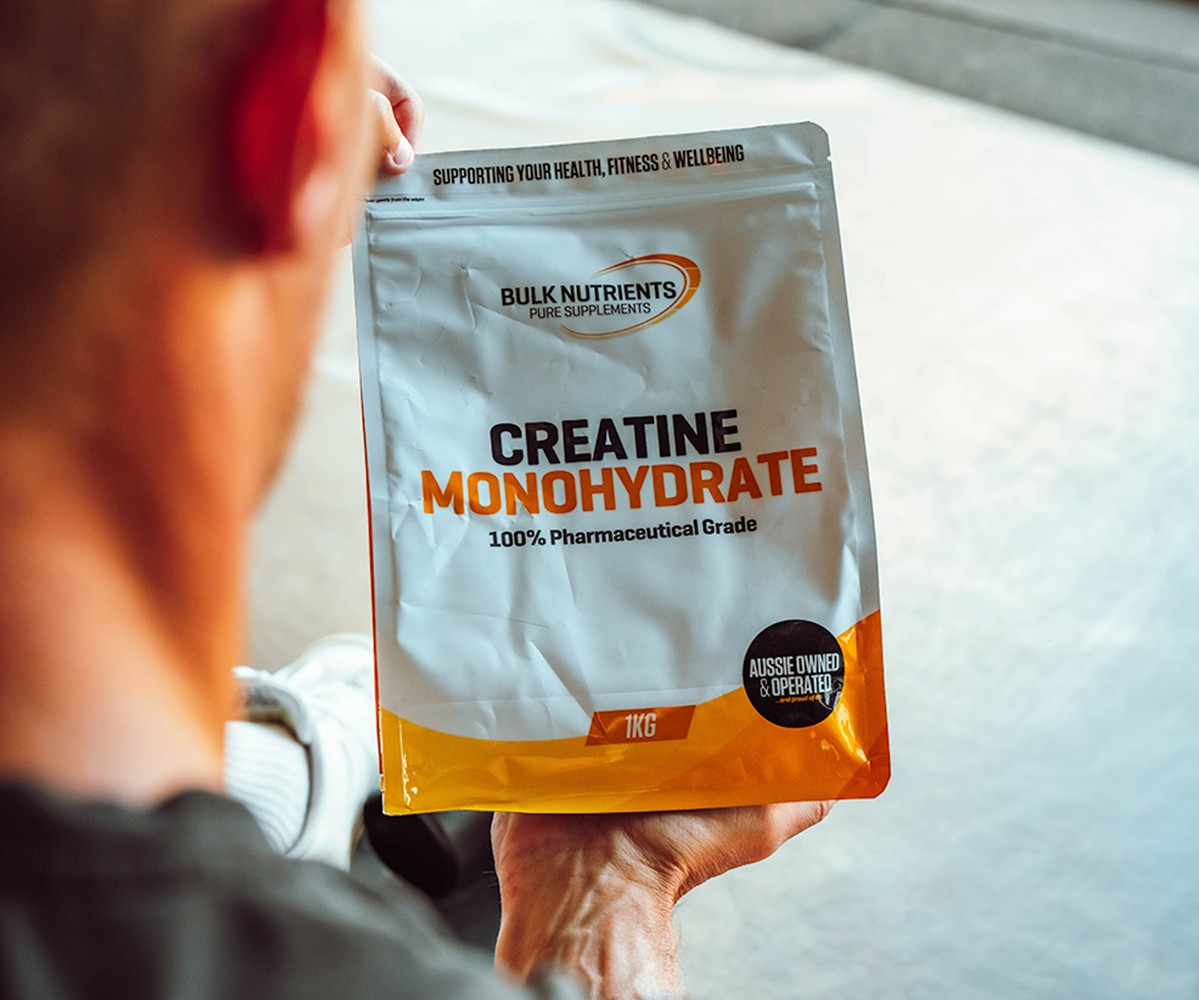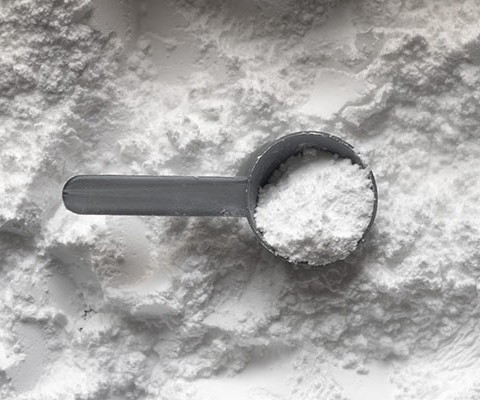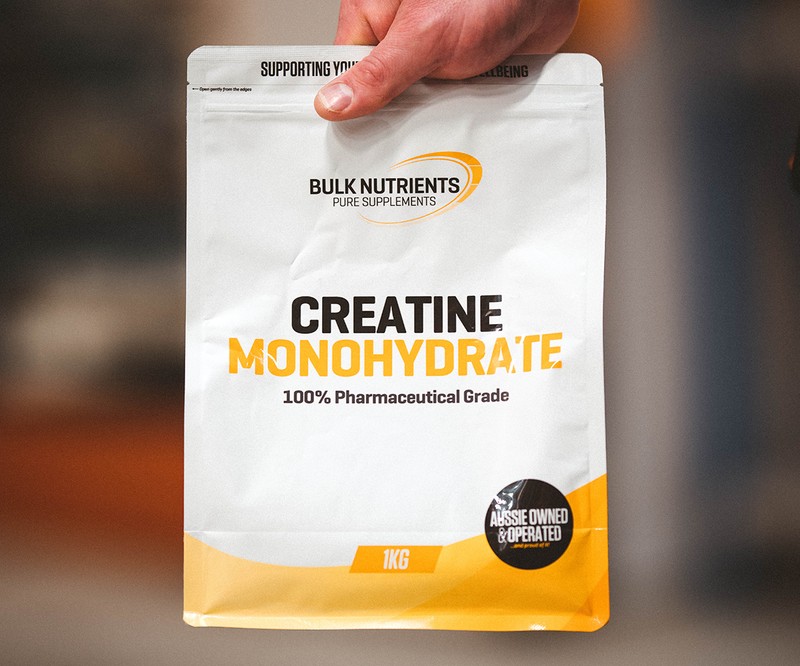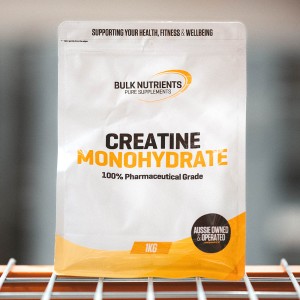How to Cycle Creatine

Should You Cycle Creatine?
You know about supplementing with creatine, but have you considered cycling your creatine intake? In this blog, I discuss how creatine can be cycled and the benefits of following a creatine cycle.
Most trainers recommend cycling creatine in some manner, but the interesting question here is, really, why cycle creatine at all? Let’s take a step back and look at what creatine is, then move on to how to cycle creatine and what the benefits might be.

What Is Creatine and What Does It Do?
Creatine is a molecule produced from amino acids in the body and can be found in some meats and fish. It plays an important role in energy production.
Creatine stores high-energy phosphate groups in the form of phosphocreatine, which is given to ADP. The body then uses this to create more ATP, which is the primary energy carrier in the human body.
Why Is Creatine So Important?
Creatine’s importance is evident when discussing improving physical performance and building muscle mass. Its role in energy production is key to keeping the body fueled during high-energy conditions, such as intense physical or mental activity.

Creatine Cycling: Let’s Begin
Creatine has been used for decades and is one of the most researched supplements, with well-established benefits for athletes and gym-goers alike. Whether your goal is peak performance or simply increasing muscle mass, there’s no doubt creatine can help. Still, some debate remains around the best way to cycle creatine—and whether cycling is even necessary at all.
The Most Common Creatine Cycle
Let’s look at a common creatine cycle:
- A loading phase of 5-7 days of 20-30g per day, split into separate doses.
- A maintenance phase of 3-5g per day, lasting for 4-6 weeks.
- This is followed by a time of phase, lasting from 2-4 weeks, before considering starting another whole new cycle again.
Let’s unpack the phases of the cycle step by step to explore what is going on here.

Supplementing With Creatine - The Loading Phase
Making Its Way to the Muscles
Whilst creatine has a relatively short plasma (blood) half-life of around 3 hours after ingestion, this isn’t the full story. After ingestion, some of that creatine will make its way into the muscles and stay there, which is where this supplement needs to be to do its thing!
In fact, contrary to the short plasma half-life, a study has shown that only 46% of ingested creatine will be excreted after around 24 hours, with creatine levels (after following a full loading phase) taking 30 days to drop to pre-supplementation levels.
The other part of the equation is muscle saturation. There's only so much supplemental creatine that the muscles will hold, regardless of how much is consumed. This is determined by genetics, amount of lean muscle mass and other factors.
For optimal benefits, the user would want to get full muscle saturation of creatine as soon as possible… right? Absolutely!
The Goal Is to Hit Peak Muscle Saturation Quickly
Obviously, once you’ve got your high-quality creatine on your supplement shelf or in your gym bag, you want it to improve your training as soon as possible… and this is exactly the intent of the loading phase, by hitting peak muscle saturation in the shortest time.
At this point, some creative readers may be thinking, “Hey, can I speed up the whole process by taking 50… 100… or maybe even the whole 150 grams of the loading phase in one go and save 5 days before hitting peak gains?”
The short answer is no.
The technical reason is that, in broad terms, creatine uptake into the skeletal muscles is limited, so most of the creatine will hit a metabolic traffic jam and not end up anywhere productive.
At a more practical—and sometimes very visceral—level, most users quickly learn why it’s best not to get carried away with loading phase doses. Overdoing it can cause gastrointestinal distress (think nausea or even vomiting), which is far less appealing than the hard training you’re here for.
How Much Creatine Can The Body Absorb?
Most users will find their experiences mirror common knowledge. The most creatine they can absorb is about 20-30 grams for 5-7 days, before hitting their muscle saturation point.
A fair question here is, how would a lifter know they've hit full muscle saturation with this supplement? Without access to complex equipment, daily urine samples, and perhaps muscle biopsies, it would be difficult to know, but before anyone starts googling for local lab supplies… the real answer is that it really doesn’t matter.
Users starting a creatine cycle will find their bodyweight initially increases due to creatine’s water-retaining properties and plateaus off at this level, regardless of whether the loading phase is continued or the dose is increased.
This is likely a good enough indication that the user is close enough to the highest muscle concentration of creatine they can achieve, and there are plenty of other aspects of training for lifters to concern themselves with, apart from worrying about whether they have achieved optimal creatine saturation.
Ok, so after discussing the loading phase, the next phase is relatively the simplest to unpack, the maintenance phase…
Supplementing With Creatine – The Maintenance Phase
Here, the user can ease off the tedium of frequent doses of creatine and coast on the more relaxed regime of 1 (or perhaps 2 at max) doses a day for a total of 3-5g daily.
Some choose to have this with their pre workout protocol, while others prefer it post workout alongside a high GI (glucose index) drink and protein to aid protein synthesis and recovery. Some may even choose to do both.
When it comes to muscle creatine concentration, the loading phase has done its job. The goal during maintenance is simply to keep levels near their peak—avoiding both dips from underdosing and waste from taking more than the body can absorb.
The subject of pre, post or even intra workout nutrition is a complex subject of highly personal preference and one we'll leave for another day. From a creatine supplement standpoint, if you’re having creatine at some point during the day, the muscles will be staying close to their saturation point, and you should be getting benefits from your creatine.
Supplementing With Creatine - Time Off Phase
Even after decades of research, this phase is still the one that's the most debated and contentious. After experiencing the benefits of creatine for 8-12 weeks, such as increased training intensity and muscle mass, sadly, all good things must come to an end.
Once again, our more inquisitive readers might rightly ask, “Well, do they?”
The answer to this is far more complex than the initial question regarding merely tweaking the loading phase.
Potential Health Issues With Continued Use of Creatine
The obvious concern is the negative health consequences of prolonged creatine supplementation. When using a common dosing regime, no significant issues to the renal, hepatic or cardiovascular system (ie: the kidneys, liver and heart) have been found to date, which would be the areas of primary concern.
The important thing to note here is that by far, the majority of research subjects were only using creatine for a relatively short time, using commonly accepted doses. The average length of studies is often the duration of the conventional creatine cycle, which shouldn’t be a coincidence to those paying attention or health-conscious individuals.
The importance of the short time frame of most studies cannot be overstated. Put simply, few studies have been done regarding large doses of creatine for longer periods of time. Given that all things in medicinal research are highly subject to individual variation, the user going off the well-marked track may put themselves in harm’s way and experience some extremely rare side effect or exacerbate an underlying (and undiagnosed) health issue. It is worth noting that in the cases of those who have purportedly done this, there is some debate about whether creatine was actually the culprit.
Remember, it’s a real achievement to be first on the podium at your chosen sport or have the best physique at the beach party, but no one really wants to be known as the first individual recorded for some unknown side effect from gobbling down as much creatine as possible for an extended length of time!

Performance Effects of Continued Creatine Use
The second issue with ignoring the time of phase, which is more related to performance than health, concerns down-regulation or accommodation.
The bro-science theory is that if your body is exposed to supra-natural doses for sustained periods, the body will eventually lose the ability to make this important amino acid for itself or obtain it from a normal diet. This is simultaneously coupled with the user experiencing less positive effects from supplementation due to the body “getting used to it”.
Whilst this has been prefaced here (somewhat disparagingly) as being merely bro science, there is some merit to this theory. Almost every substance the body is exposed to will, in fact, cause some sort of accommodation, whether it be chugging down copious amounts of coffee and experiencing tolerance (which everyone agrees is a negative) or those living at high altitudes getting better blood oxygen transportation to cope with the thinner atmosphere (which is an effect which some endurance athletes will try to take advantage of).
More broadly, the body will usually try to retain its equilibrium – often referred to as homeostasis.
At this point, it should be noted that this effect hasn’t been demonstrated in any creatine supplementation studies to date.
General Training With Continued Use of Creatine
The third point of discussion isn’t about nutrition science at all, more so about training in general.
Every sport or activity will usually lend itself to an ebb and flow over the course of the year. Bodybuilders are a great example here, going through an offseason bulk and then cutting in time for show season.
Powerlifters periodise their training between high-volume cycles and lower volume / higher intensity leading up to a competition, followed by some time off for a well-earned rest.
Even the average gym-goer will invariably have times when they have more free time and more motivation, as opposed to other times where the stresses of life mean they may struggle to get to the gym at all, which can happen to all of us.
Being aware of these times and phases is where the seemingly annoying task of cycling creatine will naturally fall into place anyway.
The similarity between bodybuilders and powerlifters is that they'll desire their body to hold as little water as possible on stage or at the weigh-in (at least not those who compete at super heavyweight water-retaining!), so they wouldn't be likely to use creatine at this point anyway, due to its water-retaining effects.
Dialling this back to a user just lifting for fun, health or aesthetic reasons, there'll still be times when a break from creatine will naturally make more sense. After all, who wants to be packing creatine in their daypack for their Whitsundays snorkelling session?

Take Away Points.
Yes, you're probably advised to cycle creatine.
Front-loading isn’t essential, but it can be useful if you want to experience the benefits of creatine sooner rather than waiting through a slow ramp-up period.
Large maintenance doses beyond those cited in studies are likely a waste of money, better spent on other supplements or equipment.
There's probably no need to fret if you're considering using creatine slightly longer than well-documented cycles, if you're still in the midst of a high-volume training protocol and still making good improvements. However, periodising your training to keep the high-volume and high-intensity work to when you're in your 4-6 week creatine cycle is probably a better idea.
Additionally, extra time “on” should probably be balanced by extra time “off”.
Creatine for Vegans
The benefits of supplementing with creatine for vegans are arguably more pronounced than those with traditional diets.
Explore more in our dedicated article Vegan Creatine Benefits.

Ben Crowley, founder of Australia's top sports supplement brand, Bulk Nutrients, combines two decades of industry experience with a commitment to employee work-life balance and career growth.
A firm believer in quality, Ben founded Bulk Nutrients to provide affordable, high-quality products, even amid global challenges.
Apart from business, he enjoys family time, outdoor activities, and adrenaline-charged car projects.
More about Ben CrowleyReferences:
- Burke DG, Smith-Palmer T, Holt LE, Head B, Chilibeck PD. (2001). The effect of 7 days of creatine supplementation on 24-hour urinary creatine excretion. Journal of strength and conditioning research, 2001 Feb;15(1):59-62.
- Hile, A. M., Anderson, J. M., Fiala, K. A., Stevenson, J. H., Casa, D. J., & Maresh, C. M. (2006). Creatine supplementation and anterior compartment pressure during exercise in the heat in dehydrated men. Journal of Athletic Training, 2006; 41(1): 30–35.
- Kim HJ, Kim CK, Carpentier A, Poortmans JR. (2011). Studies on the safety of creatine supplementation. Amino Acids, 2011 May;40(5):1409-18.
- Jeffrey R. Stout, Jose Antonio, Douglas Kalman, eds. (2008). Essentials of Creatine in Sports and Health. Humana Press, 2008 Jan; ISBN 978-1-59745-573-2
Related Blogs

Vegan Creatine Benefits
Posted by Bulk Nutrients
Estimated reading time: 5 minutes

Creatine Monohydrate - Benefits, Usage and Product Information
Posted by Nick Telesca
Estimated reading time: 5 minutes

Benefits of Creatine Monohydrate for Your Gym Pump
Posted by Jackson Peos
Estimated reading time: 9 minutes















































